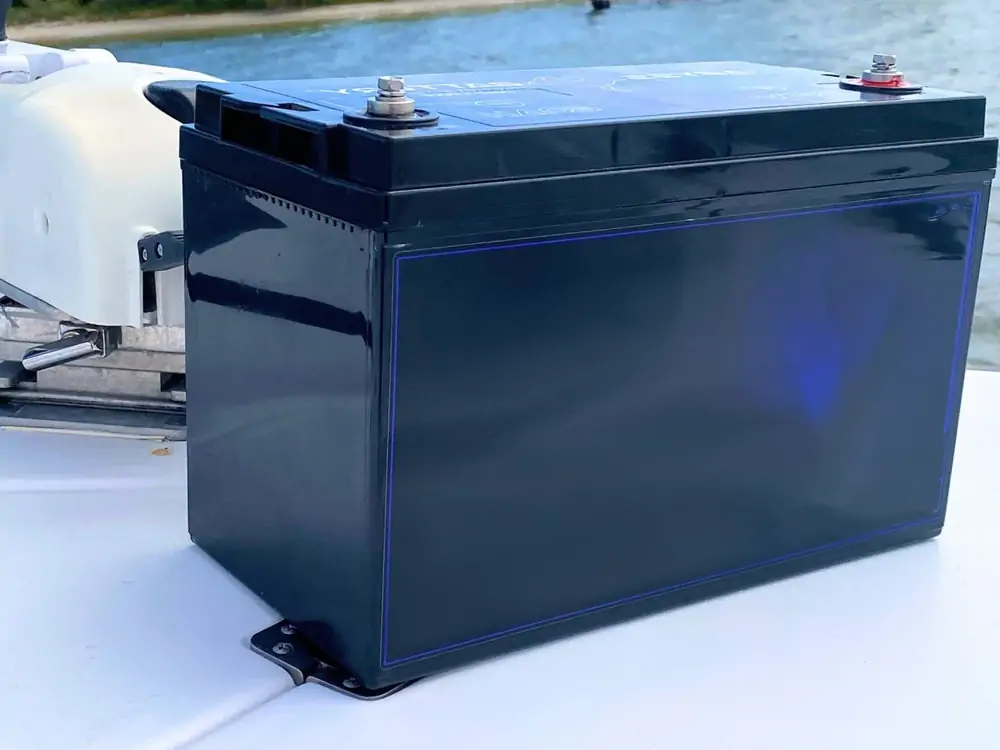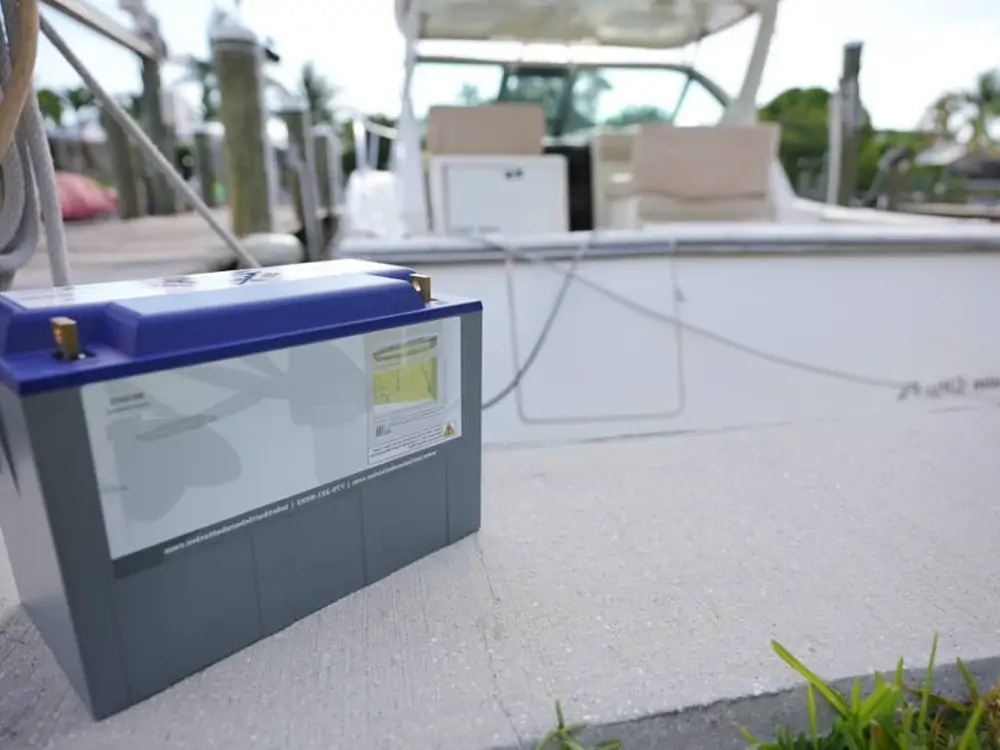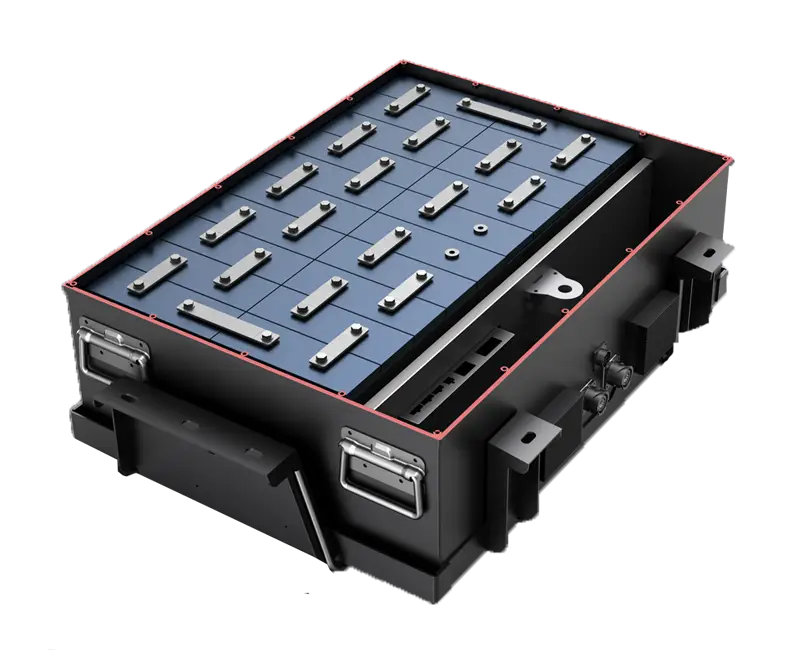If you own a boat, you may be curious: What size battery do I need for my boat? Choosing the proper type and size of the battery is critical to ensuring it can support all of the boat’s functions.
It ensures that the battery can provide sufficient power to the watercraft to operate according to your specifications.
Because of the many options currently available on the market, choosing the best marine battery type and capacity can be daunting. However, if one possesses battery knowledge and knows one’s needs, locating the most appropriate battery can be simplified.

What Does Battery Group Size Mean?
According to the norm for marine batteries, the recommended dimensions of Battery Council International’s (BCI) power cell housings, including their length, width, and height, are easily specified.
Determining the Group Size of Marine Battery
Various battery types and sizes are required to power the multiple accessories accompanying the boats of varying capacities. To supply sufficient power to a boat, the battery size must be proportional to the size of the boat and its electrical load.
Before doing anything else, determine the precise electrical load your boat is operating under to select the appropriate battery size. This is suitable for the power required to start the engine and supply power to all electrical components of the boat. After determining the energy needed, deciding on the battery size becomes possible.
Most Common Marine Battery Size Chart Available on the Market
| Group Size | Length | Width | Height |
| 22NF | 9-7/16″ | 5-1/2″ | 8-15/16″ |
| 24M | 10-1/4″ | 6-13/16″ | 9-3/4″ |
| 25 | 9-1/16″ | 6-7/8″ | 8-7/8″ |
| 27M | 12-1/2″ | 6-13/16″ | 9-3/4″ |
| 31M | 13″ | 6-13/16″ | 9-7/16″ |
| 34M | 10-1/4″ | 6-13/16″ | 9-7/16″ |
| 35 | 9-1/16″ | 6-7/8″ | 8-7/8″ |
| 65 | 12-1/6″ | 7-9/16″ | 7-9/16″ |
Types of Marine Battery for Boat – Selecting the Right One

1. Dual-Purpose Power Cells
A power cell of this nature is constructed with thick plates containing significant amounts of antimony. Starting or deep-cycle batteries are generally preferred. There are certain circumstances in which a dual-purpose power cell may be more advantageous. Deep discharging operations are more tolerable for these batteries than starting batteries. However, reduced storage capacity may hinder their ability to handle greater electrical loads.
2. Deep Cycle Power Cells
A deep-cycle battery is an energy cell specifically engineered for deep discharging operations. This battery type accommodates greater power storage capacity and extended endurance. These batteries are designed to supply sufficient power. They can operate larger electrical loads autonomously and without a power source.
Their prolonged service life results from the construction of sturdier battery plates. This is advantageous for yacht owners. Charging these batteries requires time. The duration needed to charge them entirely is proportional to the level of discharge present.
3. Starting Power Cells
This kind of marine battery is made to help start boat engines and give enough power to the boat’s electrical system. Between 75 and 400 amps can be sent from most of these batteries in 5 to 15 seconds. The engine’s generator also slowly charges them. Also, these batteries are made with smaller plates packed more closely together. This lets them produce large amounts of power in short bursts.
However, this kind of battery is weak in harsh conditions, so it can’t be used for heavy discharge. This shortens its life, which could mean that some of the boat’s electrical parts must be fixed more often.
Chemistry of Different Types of Marine Battery for Boat
It is now appropriate to delve into the various facets of battery chemistry. Furthermore, this is essential when selecting a battery that can adequately power your boat. For an overview of the various battery chemistry processes, check the following list:
1. Gel Type Batteries
Gel-type power cells are batteries whose electrolyte is a gel, making them significantly safer to operate. These batteries are constructed to withstand submersion, leakage, and spills without requiring maintenance. They discharge at a reduced rate and are designed to prevent emissions. Due to their distinctive chemistry, they are considerably more convenient to use and safer to implement.
2. Lithium-ion Batteries
This is the most recent battery technology currently available on the market. It provides numerous advantageous characteristics. These include an extended operational time, increased capacity for electrical storage, and a rapid rate of recharging. Another characteristic of this type of battery is a lighter and more compact housing. This battery type is quite pricey. So, numerous yacht owners are hesitant to select this particular form of power cell.
3. AGM Batteries
Among the best batteries for boats is an absorbent glass mat battery. Its battery separator technology distinguishes it. This power cell utilizes dry electrolytes. Many boat owners prefer this battery. It has increased storage capacity, a greater number of cycles, and enhanced endurance. This is one of the best options for the propulsion of larger boats.
Marine Battery Buying Guide: Tips to Select the Best Marine Battery for Boat
Here are the following recommendations and concerns that will assist you in purchasing the best battery for your boat.

Consider the Cold Cranking Amps (CCA)
Low temperatures and cold weather make it difficult for batteries to power an engine. Assess the Cold Cranking Amps of a marine battery for this reason. It indicates whether the battery has sufficient capacity to activate your yacht’s engine in low-temperature or frigid weather. A chilly cranking amp (CCA) rating of greater on a battery is preferable in the context of a boat. Starting your watercraft’s engine with the battery will not be difficult in cold temperatures.
Determine the Needs of Your Boat
To identify an appropriate power cell for a boat, it is imperative to ascertain the total electrical capacity and the current required to initiate the engine. As stated, your marine battery will be responsible for two distinct functions.
Start the operation of the boat’s engine and its complete electrical system. You will know the type of battery required to perform these two critical duties if you have an approximation of their values.
Type and Chemistry of Battery
When selecting a battery for your yacht, it is crucial to ascertain that you are procuring the proper battery type. Additionally, ensure that the chemistry of the good boat battery you select suits the applications for which it will be used.
It is critical to consider this. Ensure the battery you buy can withstand the rigorous demands of your boat and its various applications. For further clarification, consult the section above describing the different types of batteries.
Design and Upkeep
When selecting a marine battery, it is also critical to consider the power cell’s construction and required maintenance. Batteries that require no maintenance and have sturdy construction are the best option. In addition to being more user-friendly, these devices offer extended service life and reduced upkeep costs. Furthermore, contemplating the power cell’s design facilitates the battery’s installation process.
Reserve Capacity of the Power Cell
The reserve capacity of a power cell denotes the duration for which it can operate autonomously and supply the necessary electrical energy to the boat’s components. It approximates the time required for an ultimately charged marine battery to discharge at a rate of 25 amps to decline below 10.5 volts.
To operate the entire electrical grid using only the battery, your boat’s reserve capacity must be increased proportionally to its electrical burden. Higher reserve capacity batteries can be a bit pricey. Therefore, consider all your options before purchasing.
To Wrap-Up
Suppose you own a boat and are still determining where to locate a replacement or new battery installation. You may want to know what size battery I need for my boat. You’re in the proper location if you wish to obtain an answer to this inquiry. This blog will cover every detail regarding the various sizes of available marine batteries. If you want to know more, please get in touch with us.
